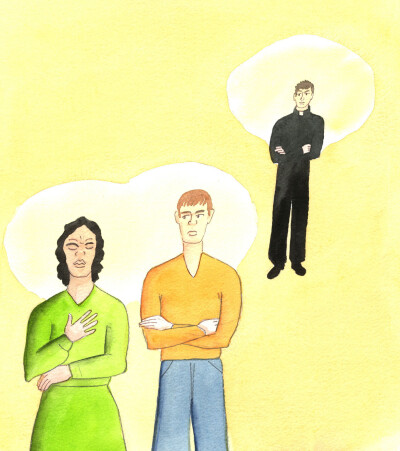Search Page
Showing 81 - 100 of 106
God's choice of a man for the Priesthood is forever. God does not change His mind about a man to whom He had given great gifts, at Ordination, for the sake of the Church - though a man might disqualify himself from active service for various reasons.
If a carpenter makes a good table, but finds that the table wishes to be a truck, he would be amazed. Just as silly would be a hedgehog who wishes to be a gazelle, or a person destined for sainthood, and Heaven, who wishes to spend his life fulfilling selfish ambitions, careless about his eternal destiny and even involved in grave sin.
We can imagine a group of Christians in Roman times, hearing about the privileged men who are chosen to be ordained, to serve as priests in the Church - and to make Christ Really Present in the Holy Eucharist. How fervently some might have said: "Oh! I hope I'm chosen!" It is a hard life, but most men feel honoured to be called by God, though they are unworthy.
Especially in matters connected with other religions, every member of the clergy should be aware of the impact on others of his gestures as well as his words. If he acts in ways that confuse the faithful, or give wrong impressions to people who do not share the Catholic Faith, he is not fulfilling God's plan for his life and for his special vocation.
Priests must be determined to grow in holiness. Men are called by Christ so that the faithful can have a Christ amongst them where they live, and Christ made Really Present in the Blessed Sacrament because of the priest who celebrates the Mass. Amongst pure priests, God sees, here and there, however, a gloomy figure: like an empty space, symbolising a lack of charity, when a priest is in serious sin.
St Paul was full of fervour, and ideas about how to spread the Gospel; yet Christ guided Saint Paul in specific ways, showing him what places to go to and which to avoid, with marvellous results. Yet Christ cannot guide Catholics today, to do great works, if they are not willing to obey Him in everyday matters, including morals, and if they ignore or argue about the Church's teachings.
Priests, especially, must not regret their state of life. We cannot avoid all suffering, in this life, but God can help us to bear it. No-one should envy people who have another vocation. Which is the greater sacrifice: doing without marriage, to become a priest, or suffering within a difficult marriage, to be faithful to the Lord's teaching? God the Father will reward all who make sacrifices for His sake, since He is just.
Celibacy is about love: Love wants to give up everything for the Beloved; and, for the priest, the Beloved is the Father Who has called him and asked him to act as His Son.
Christ is explaining to all who are called to be celibate priests that in their celibate state they can imitate Him, by His grace, not treating celibacy as a burden but a help to total self-donation to God, in the Church. They can be confident of receiving the necessary graces; and seminarians have the inestimable privilege of having Jesus Christ Really Present amongst them in the Blessed Sacrament of the tabernacle and altar.
At Pentecost, the Blessed Virgin Mary completely surrendered yet again to the light and power of the Holy Spirit as they poured down upon her from Heaven. She had followed the Spirit's guidance for the whole of her life, and that is what the Spirit asks us to do, and to do so by following all that He teaches and advises us through the Church, and in our individual vocations.
The Holy Spirit, Who brought together thousands of priests to offer a Mass with Pope Benedict on one occasion, is the Spirit of Jesus Christ, Who chose each of those men. Each responded. Christ chose each one even before each emerged from his mother's womb. Christ wants each one to persevere, and never to become despondent, or give up, because of his own sins and weaknesses.
It is only reasonable to believe the evidence of our eyes and ears. If we saw blood flowing in a gutter, we would search the road for an injured body, and would find it. If we see plain evidence that hundreds of thousands of Catholics have abandoned their vocations, or left the Church, we are sensible if we look back, to find the cause. It lies in the aftermath of the Second Vatican Council, in the exaggeration, rebellion, dissent, and selfishness that cause traditional teaching and liturgy to be despised.
The view from Heaven: Christ, looking down at the world, sees his priests as 'other Christs', each a visible 'embodied' Christ in a particular place on earth, each chosen and made ready to sanctify the Faithful and to teach those who do not yet know Him, each one visible, truth-speaking, kind, prayerful, and trusting in the Father's plans and the Spirit's power.
The Purpose of the Priesthood, by Elizabeth Wang
‘The Purpose of the Priesthood contains encouragement and advice for Catholic priests. It reminds them about the central meaning of the Priesthood, and about the need to teach the Catholic Faith in it…
How to Pray: Preparation, by Elizabeth Wang
This text is published as Chapter 1 of How to Pray (Part One: Foundations), entitled 'How to Prepare'. An introduction to the life of prayer with much practical advice about how to deepen your prayer…
How to Pray: Basics, by Elizabeth Wang
This text is published as Chapter 2 of How to Pray (Part One: Foundations), pages 9-18, entitled 'How to Pray'. An introduction to the life of prayer with much practical advice about how to deepen you…
How to Pray: Perseverance, by Elizabeth Wang
This text is published as Chapter 3 of How to Pray (Part One: Foundations), pages 19-30, entitled 'How to Persevere'. An introduction to the life of prayer with much practical advice about how to deep…
How to Pray: Stages of the Spiritual Life
This text is published as Chapters 7 and 8 of How to Pray (Part One: Foundations). An introduction to the life of prayer with much practical advice about how to deepen your prayer life.
7 ABOUT TH…
Autobiography of Elizabeth Wang, Part 1
This text forms part of Elizabeth Wang's Falling in Love: A Spiritual Autobiography (1999). It tells the story of her life and of her spiritual journey as she came to know Christ and His Church.
You …
Autobiography of Elizabeth Wang, Part 2
This text forms part of Elizabeth Wang's Falling in Love: A Spiritual Autobiography (1999). It tells the story of her life and of her spiritual journey as she came to know Christ and His Church.
You …
Showing 81 - 100 of 106













